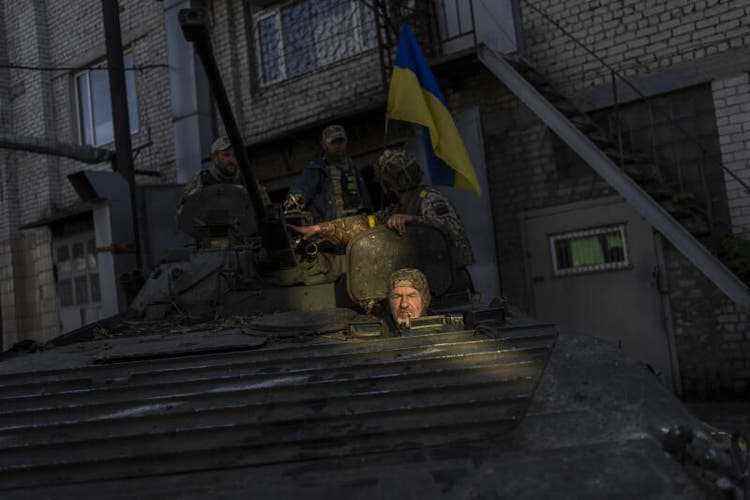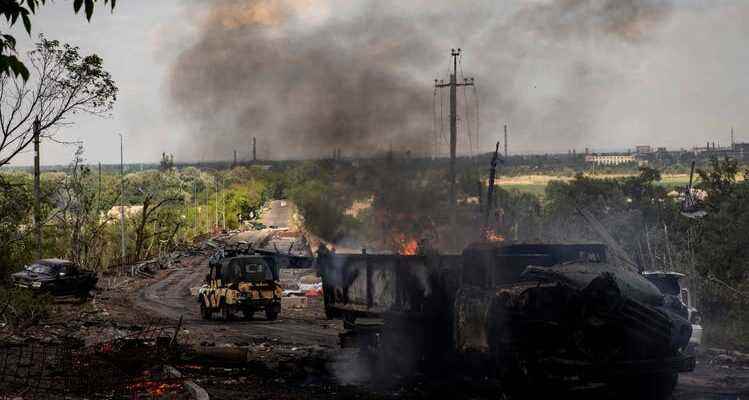The Russian army moves into Severodonetsk. Ukraine is withdrawing its troops. This opens up the chance for increased counterattacks to retake key terrain.
The bridge at the western exit from Severodonetsk near Lisichansk seemed particularly contested. Among other things, this axis enabled the Ukrainian troops to tactically withdraw from the pocket.
The Russian breakthrough at Severodonetsk sounds like a success story for the Kremlin. The Ukrainian army gives up ground. Russian President Vladimir Putin appears to be getting closer to his minimum goal of completely occupying the eastern Ukrainian provinces of Luhansk and Donetsk. The attackers now control around 70 percent of the city, as the governor of the Luhansk region, Serhi Haidai, writes on his Telegram channel.
But from a military point of view, the Ukrainian withdrawal is the real success. The Russian army did not manage to make the axes to the west impassable or even to occupy them. The General Staff in Kyiv, on the other hand, managed to withdraw its forces from the Severodonetsk pocket in good time. According to publicly available information, at least three Ukrainian brigades were saved from Russian encirclement.
Counterattacks on sub-zones
The decision not to defend Severodonetsk to the utmost may have been a difficult one for Kyiv. By saving their own formations from possible destruction, as the tactical term unequivocally suggests, the Ukrainian army leadership is letting the attackers run into nothing. For the Kremlin, Severodonetsk currently appears to be the main focus of the operation. The Russian forces have concentrated accordingly in this area.
In contrast, Kharkiv in the north-east and Cherson in the south-west of the current theater of war are clearly secondary zones. The Russian army contented itself with holding its positions. The strength there is currently not sufficient to advance further. The Ukrainian defenders, on the other hand, do not focus on the Russian heavyweight zone, but rely on counterattacks in the adjacent zones.

Territorial defenses bear the brunt of counterattacks north of Kharkiv.
The American Institute for the Study of War came to the same conclusion in its latest situation report: “The Ukrainian leadership apparently wisely avoided following Putin’s wrong setting of priorities.” The tactical withdrawal from Severodonetsk should even increase the Ukrainian army’s freedom of action. Additional formations are available to reinforce or resume counterattacks elsewhere.
In Kharkiv, these have come to a standstill in the past few days. The aim is to retake the areas north of Ukraine’s second largest city. The enemy is to be pushed back across the border. This would give Kharkiv better protection from Russian artillery fire. At the same time, the Ukrainian army would be able to reach the Belgorod hub across the border with its new M777 howitzers and the most modern version of Excalibur ammunition, thus hitting Russian supplies hard.
Military common sense for a good negotiating position
The Russian army is therefore trying with all its might to hold its bridgehead west of the Donets near Ternova. This keeps the connection to the other occupied areas intact. Up until now, a territorial defense brigade on the Ukrainian side has carried out counterattacks north of Kharkiv practically single-handedly. Their success depends, among other things, on their high level of commitment. If these associations receive significant reinforcement, further repossessions are conceivable.
But the troops that have just been withdrawn from Severodonetsk must first be reorganized. They were under constant artillery fire. In addition, they suffered losses in men and material. It will therefore take time before these bandages can be used again. However, the time until the next Ukrainian actions in the adjacent zones is a critical success factor. As long as the Russian army puts its main emphasis on the Severodonetsk area, the chances of successful counterattacks towards the border are good.
Ukraine has refrained from burning its own troops in a boiler for reasons of political symbolism. This shows the will to gain the upper hand in war. Kyiv wants to continue to create favorable conditions for later negotiations on an equal footing with the Kremlin. A peace according to the will of Russia should continue to be prevented.
